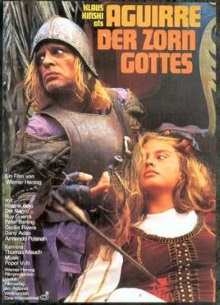
Over the past several years, we’ve made a pretty decent go at sampling at least a little bit of the oeuvre of each of the great directors of cinema. One especially notable omission has been German filmmaker Werner Herzog so this one is probably his single best known film. This is the first Herzog film I’ve seen but there will likely be many to follow.
In the 16th century, an expedition of Spanish conquistadors search for the legendary El Dorado. When the main group becomes bogged down amidst the narrow mountain paths and thick jungle, the leader splits off a scouting party. Ursua leads this smaller party and Aguirre is chosen as his second-in-command. Accompanying them are Ursua’s wife, Aguirre’s daughter, a nobleman Fernando de Guzmán and a priest Gaspar de Carvajal. While travelling down the river however, one of the rafts is trapped in currents and overnight everyone on it is killed by the natives. Another morning, all of the remaining rafts are swept away while everyone is sleeping ashore. Ursua orders them to turn back but Aguirre successfully instigates a rebellion, promising the soldiers untold riches if they press on ahead. They even declare secession from Spain and choose Guzmán as their new king.
It goes without saying that things do not end well for these conquistadors and indeed we’ve already watched several films about an ill-fated boat journeying downriver through a deadly jungle. This film even predates Apocalypse Now and so probably influenced it. Still this is fantastically rich material for cinema and the execution here does more than do it justice. It isn’t just the wrathful Aguirre who becomes ever more unhinged as the journey goes on. Guzmán for example seems at first like something of a buffoon when Aguirre picks him as his puppet but grows to enjoy his role and soon is boasting that his new kingdom is six times the size of Spain. The elaborate dining arrangements he still enjoys make things even more absurd as the other soldiers count out individual grains of corn to eat. Equally silly are the elaborate costumes of the two women who look impeccable even as the expedition falls into ever more dire straits. Yet their presence seems to be the very last layer of the veneer of civilization left to them.
Parts of the film are stunningly beautiful. The opening shot of the expedition navigating a mountain path so steep that for a moment you’re confused about the orientation of the camera is a fantastic example. The film looks great throughout but there are moments when it looks like it could have used a bigger budget. For example, the soldiers are steadily killed by arrows without us seeing so much as a glimpse of the attackers. This reinforces the sense that the film is about the conquistadors and not the natives. However the framing of the shots make it obvious that the actors had the arrow props on their bodies all along and there were never any flying projectiles at all, which makes these scenes look somewhat comical. The sound quality is poor as well as noise levels don’t seem match what is visibly present in the scene. It seems that it isn’t even Klaus Kinski’s voice saying Aguirre’s lines as the actor was asking for too much money for the sound recording sessions.
There’s no doubt that this is a truly great film and it only makes me more excited to see more of Herzog’s work. Still the production quality problems make this not quite the visceral experience that I’d hoped it would be. This film may have paved the way but something like Embrace of the Serpent for example has since pushed this type of story to new heights. Finally do read up a bit on the crazy stories surrounding the making of this project. It feels like whenever someone tries to make a film about an insane person going on a river trip through a jungle, the cast and crew inevitably catch a bit of the craziness.
One thought on “Aguirre, the Wrath of God (1972)”